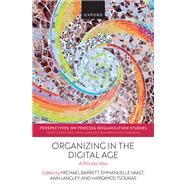Organizing in the Digital Age A Process View
, by Tsoukas, Haridimos; Langley, Ann; Barrett, Michael; Vaast, Emmanuelle- ISBN: 9780198899457 | 0198899459
- Cover: Hardcover
- Copyright: 7/25/2024
Organizing in the Digital Age draws on a process-oriented perspective to understand the pervasiveness of digitalization in organizations, and contemporary society. Ongoing and multiple crises, whether it be the pandemic, the economy, or climate change, have magnified the importance of digital technologies in processes of organizing and accelerated the role of digital transformation in work-life.
The central themes underpinning the chapters in this book concern the becoming of digital work, the conceptualization of agency in digital work, and the role of temporality in contemporary organizing. The increasing entanglement of digital technologies and work (accelerated through the Covid-19 pandemic) have fuelled interest in the need for understanding digital work happening at scale, while also examining and exposing inequalities. The concern with the role of agency in digital work reaches new heights when we consider the rapid and pervasive development and implementation of Artificial Intelligence (AI), and algorithmic control, and raises concerns about the ethical and moral dimension of agency. Methodologically, the book explores the use of digital trace data as a resource in the study of organizing processes. While digital traces offer unprecedented access to temporally evolving activity, they are nevertheless limited in their ability to represent phenomena. In essence, 'processual shadows' visible from digital data traces may be difficult to interpret without in-person observational data such as ethnography. Theoretical approaches around performativity are discussed in terms of the impact (or not) of innovative digital technologies, such as blockchain in organizations, while routine dynamics and pragmatism are drawn on in providing a processual understanding of the why and how of IT computer workarounds within organizational work practices.
The central themes underpinning the chapters in this book concern the becoming of digital work, the conceptualization of agency in digital work, and the role of temporality in contemporary organizing. The increasing entanglement of digital technologies and work (accelerated through the Covid-19 pandemic) have fuelled interest in the need for understanding digital work happening at scale, while also examining and exposing inequalities. The concern with the role of agency in digital work reaches new heights when we consider the rapid and pervasive development and implementation of Artificial Intelligence (AI), and algorithmic control, and raises concerns about the ethical and moral dimension of agency. Methodologically, the book explores the use of digital trace data as a resource in the study of organizing processes. While digital traces offer unprecedented access to temporally evolving activity, they are nevertheless limited in their ability to represent phenomena. In essence, 'processual shadows' visible from digital data traces may be difficult to interpret without in-person observational data such as ethnography. Theoretical approaches around performativity are discussed in terms of the impact (or not) of innovative digital technologies, such as blockchain in organizations, while routine dynamics and pragmatism are drawn on in providing a processual understanding of the why and how of IT computer workarounds within organizational work practices.






